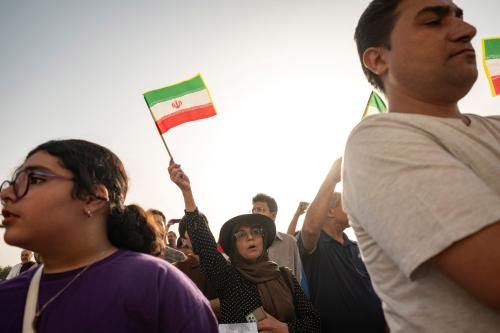After two-and-a-half rocky years, the Bush administration’s Korea policy is poised to achieve its first success—and it’s an important one. North Korea has agreed to discuss its nuclear weapons programs at a conference in early September with the United States, China, Japan, Russia and South Korea.
If the conference’s goal of a nuclear-free Korean Peninsula is to be achieved, Pyongyang’s uranium enrichment program must be convincingly dismantled, along with the better-known plutonium-producing facilities at Yongbyon. Separated plutonium and any irradiated fuel rods not yet processed for their plutonium should be removed from the country.
It is far from certain that U.S. pressures and inducements will be enough to stop and roll back North Korea’s weapons programs. The best chance for enduring success lies in an approach that will be difficult for the United States to embrace wholeheartedly: End the 50-year stand-off and replace the 1953 armistice agreement with a peace treaty or its equivalent. Piecemeal approaches have been tried. They don’t address the basic problems and ultimately they fail.
Many in the Bush administration want regime change in North Korea and think that slow strangulation might do it. But the key to ending the last major cold war confrontation would be to give North Korea security assurances like those the United States gave to Ukraine when it surrendered the nuclear weapons it had inherited from the Soviet Union. Economic incentives to North Korea aimed at bringing its economy into the global marketplace would help. Improving the lot of the North Korean people should be a fundamental aim.
Even if the United States were to lay the groundwork for such potential breakthroughs in the forthcoming negotiations, the fact remains that North Korea’s leader, Kim Jong Il, has a tiger by the tail. He may not know how to let go.
If Kim opened North Korea to outside influences, his basic goal of regime survival would be jeopardized, as he saw from the Soviet experience. Only if he pulls off a Chinese-style modernization—which he has examined close-up during a visit to China—could Kim hope to have his cake and eat it too. It’s a risky bet even for the high roller that he seems to be.
For North Korea’s negotiating partners, the convening of a six-nation conference could be a success even if Kim Jong Il cannot bring himself to face the risks of losing control. A multilateral Northeast Asian security structure could be set up that would encourage military transparency and cooperation, and provide a forum for defusing crises.
With Asia on the brink of a nuclear arms race, a Northeast Asia security mechanism would provide a useful alternative to diplomatic practices of the last century, which have proved insufficient.
At an appropriate time, the Bush administration should propose that the six-nation forum become a permanent structure to promote peace and security in the region. Such a forum could support any agreement reached with North Korea. If no agreement with North Korea proves possible, a Northeast Asia security forum would help the other five nations coordinate their responses to the situation and help them contain the threat that North Korea would continue to pose.
The Brookings Institution is committed to quality, independence, and impact.
We are supported by a diverse array of funders. In line with our values and policies, each Brookings publication represents the sole views of its author(s).



Commentary
Op-edA Chance To Turn the Nuclear Tide
August 5, 2003